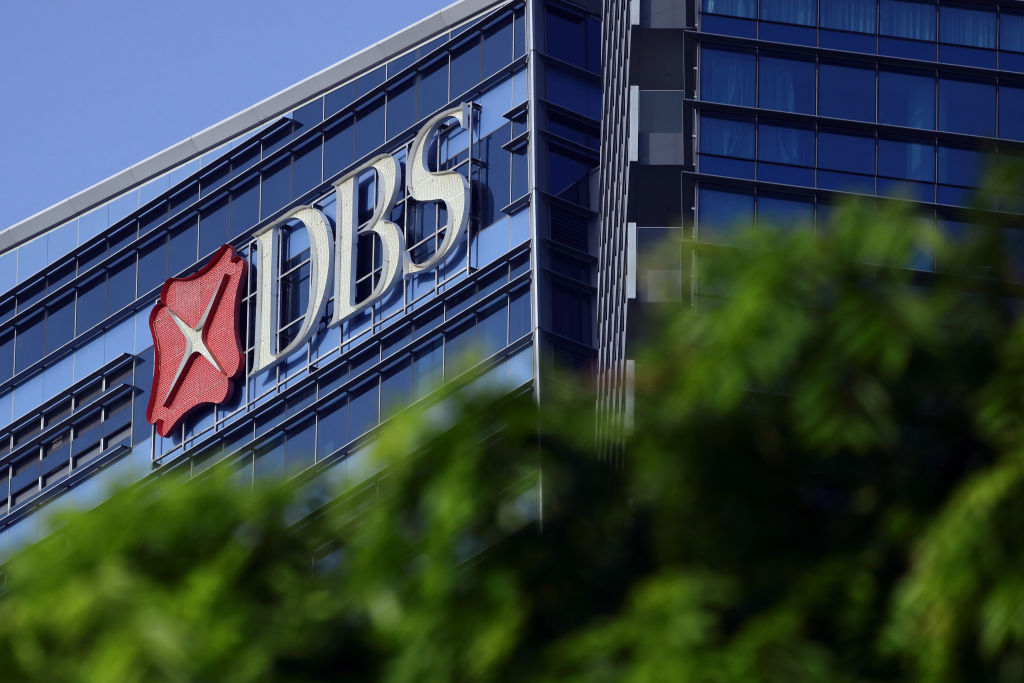When buying bank stocks, think small for the best value
Bankers love to build bloated global empires, but that rarely rewards their investors, says Bruce Packard


Get the latest financial news, insights and expert analysis from our award-winning MoneyWeek team, to help you understand what really matters when it comes to your finances.
You are now subscribed
Your newsletter sign-up was successful
Want to add more newsletters?

Twice daily
MoneyWeek
Get the latest financial news, insights and expert analysis from our award-winning MoneyWeek team, to help you understand what really matters when it comes to your finances.

Four times a week
Look After My Bills
Sign up to our free money-saving newsletter, filled with the latest news and expert advice to help you find the best tips and deals for managing your bills. Start saving today!
After a couple of decades in the doldrums, UK banks have performed well over the past 18 months. The FTSE 350 Banks index is up by 70% since the start of 2024, outperforming both the Nasdaq (up 35%) and the S&P Regional Banks index in the US (up 12%).
When it comes to investing in banks, common-sense “buy and hold” investing rarely works: HSBC and Standard Chartered – the best performers over the past 20 years – have seen their share prices fail to keep pace with inflation, while diluting shareholders with capital raisings over the years. A counterintuitive approach has produced superior results: wait until the whole sector’s fortune has turned and then buy the lowest-quality banks. We have seen the same outcome this time: it is Metro Bank (up 196%) and NatWest (up 147%) that have been the best performers.
Two headwinds that UK banks have faced ever since the crisis have now reversed: loss-absorbing equity funding has been restored, while interest rates have risen well above post-crisis lows. Low interest rates are normally seen as a positive for banks, but when the cost of money falls too low, the banks’ “free float” from current account deposits – a reliable and cheap source of funding – don’t enjoy any relative advantage versus funding in wholesale debt markets.
MoneyWeek
Subscribe to MoneyWeek today and get your first six magazine issues absolutely FREE

Sign up to Money Morning
Don't miss the latest investment and personal finances news, market analysis, plus money-saving tips with our free twice-daily newsletter
Don't miss the latest investment and personal finances news, market analysis, plus money-saving tips with our free twice-daily newsletter
Of course, if UK banks had not lent out so much money in the first place that interest rates needed to be cut below 1%, then they wouldn’t have had to spend the last decade and a half managing the problems caused by low interest rates. However, with the interest-rate cycle returning to more normal levels and equity cushions rebuilt, banks have re-rated from trading at 25%-50% discounts to tangible book value (TBV) to roughly 1.1 times TBV currently.
The banking environment is benign enough that we may even have an initial public offering (IPO) from Shawbrook, a small business lender owned by private equity groups BC Partners and Pollen Street Capital. Shawbrook may float later this year and is targeting a £2 billion valuation. However, that valuation looks ambitious given the performance of past IPOs such as Metro Bank, Funding Circle and CAB Payments, which all fell by more than 80%. These investments did very well for early investors who got in before they listed and received a windfall gain at the expense of public-market investors. Anybody buying into the Shawbrook IPO would need to be sure that sellers are not timing their sale to exit just before problems emerge.
UK bank stocks
Still, even as the environment has improved, questions remain about the long-term growth prospects for UK banks. Household debt – mainly mortgages – currently stands at about 80% of GDP in the UK, above the level seen in the USA and the European Union (although the latter shows wide dispersion, with some countries such as the Netherlands and Denmark approaching household debt close to 100% of GDP). We are close to the limit as to how much household and government debt the banking system can support, which limits domestic growth opportunities.
From 2004 to 2024, Lloyds doubled revenue to £18 billion, yet book value per share shrunk by half to 75p. That’s mainly a result of the ill-conceived “rescue” merger with HBOS in 2008, which at the time had a balance sheet twice the size of Lloyds'. Barclays has grown revenue by 40% to £21 billion over the same period, while book value per share doubled to £5 as of December 2024. Yet earnings per share (EPS) are still down by a third to 35p. The only UK clearing bank to grow revenue, book value and EPS over that time is HSBC. Still, an increase in revenue of 21% and NAV per share up by less than 80% equates to compound annual growth rates of less than 1% for revenue and under 3% for NAV.
Bank stocks in small territories
Growth for UK banks could come from overseas expansion, but here the record is mixed. Bankers, being dull and unimaginative people, like to expand their footprint into countries with large populations, but it has been small, fast-growing territories with strong institutions such as Hong Kong and Singapore that have most rewarded investors.
HSBC (formerly the Hong Kong and Shanghai Banking Corporation), market cap £170 billion, and Singapore’s DBS, market cap £83 billion, have long since outgrown their city-state roots. Although less familiar to most UK investors, DBS’s track record is more impressive than HSBC’s. It is three times the size of Bank Rakyat (market cap £27 billion), the largest bank in Indonesia, which has almost 50 times the population of Singapore. It is also around four times the size of Maybank (market cap £20 billion) in neighbouring Malaysia, which has six times the population.
A large amount of credit for the far greater success of DBS and its peers OCBC and UOB relative to regional neighbours goes back to the Singapore’s first prime minister Lee Kuan Yew, who transformed the country from a swamp to a first world economy, with the help of air conditioning and British institutions. The crucial lesson that while banks are intrinsically linked to their domestic economies, it is strong institutions rather than a large population that make for an attractive investment case.
A bank that didn’t learn – and one that did
In recent years, HSBC has been shrinking its global network as it became obvious even to management that the bloated corporation with 9,800 offices in 77 countries and 243,000 staff was suffering from diseconomies of scale. The most recent annual report says it has trimmed that number down to 58 countries and 211,000 staff. Shrinking a global business is much more challenging than growing. HSBC has exited countries such as Canada, Brazil, Argentina and France, often ignominiously.
It was easy for HSBC to expand into France originally, points out Marc Rubinstein, a former hedge fund manager turned financial blogger – the bank simply offered to pay more than rival bidders to acquire Crédit Commercial de France (CCF) in 2000. Twenty years later, HSBC struggled to find anybody to take CCF off its hands. Private-equity firm Cerberus paid HSBC a single euro to assume $2 billion of tangible book capital, together with 244 branches and nearly 4,000 staff. HSBC booked a $2.3 billion pre-tax loss, alongside a $700 million goodwill impairment charge. Now, a new threat has emerged. App-based banking and payments firm Revolut currently has 52.5 million customers – of whom 14.5 million joined over the past year – compared with HSBC’s 41 million. It is licensed in 30 countries, including Brazil and Mexico, and in 2024 submitted 10 new licences to banking regulators as it works towards a target of 100 million customers across 100 countries. UK-based rivals Monzo, Starling and Atom Bank and others such as N26 (Germany) and Nubank (Brazil) are also threatening traditional branch-based banks.
These neobanks operate with structurally lower costs: Revolut has just over 10,000 staff – that’s 5% of HSBC’s total, despite having more customers. Revolut grew customer balances by 66% to £30 billion, while Monzo saw deposits up 48% to £16.6 billion. While HSBC has $1.65 trillion in customer deposits, that amount has shrunk from the 2021 level. These new entrants are now radically upending how we think about the investment case in banks. Yet perhaps DBS is a case study on how incumbents can respond to disruption.
DBS has won awards for “World’s Best Bank” from Global Finance and Euromoney, and been voted “Global Bank of the Year” by The Banker. More concretely, it has increased revenues fivefold over the past 20 years in US dollar terms – far ahead of HSBC. TBV per share is also up five times in US dollars, and the shares now trade on a multiple of almost 2.1 times.
Much of this success can be attributed to Piyush Gupta, the former chief executive who ran DBS for 16 years before retiring this year. After a meeting in 2014 with Jack Ma, the founder of Chinese tech giant Alibaba, DBS began its digitisation strategy. Staff were encouraged to learn from tech companies, asking not “what would Jamie Dimon do?” but “what would Jeff Bezos do?”. The bank has expanded via strategic deals in Asia, buying Citigroup’s Taiwan consumer unit and transforming its small operation in India by buying Lakshmi Vilas Bank when the latter failed in 2020.
DBS now has 18.4 million customers, up from 4.9 million a decade ago. The market cap of £83 billion implies that each customer is now worth just under £4,700, compared with just £1,800 for Lloyds Bank. So it now looks fully valued. Still, investors looking for banks with strong growth prospects could take on board the lesson of looking for well-run banks in small markets that can expand shrewdly.
Bank stocks in Georgia
Take Tbilisi-based Lion Finance (LSE: BGEO) – previously known as Bank of Georgia – which is listed in London and part of the FTSE 350 banks index. It has grown revenue in US dollar terms by 58 times to $1.3 billion over the past 20 years. Book value per share is up 18 times. I last wrote about Lion Finance in April 2022 when the share price was £12. Today, it is £80.
At the start of 2024, the group has bought an Armenian bank for $300 million. That price equates to just 0.65 times historic book value or 2.6 times 2023 earnings. When questioned about this attractive valuation, management pointed out that there simply weren’t many buyers able to write a cheque for $300 million to buy an Armenian bank. At the end of July, Lion Finance confirmed press speculation that it is in talks to buy a 70% stake in HSBC’s Malta operations (Ardshinbank, an Armenian bank owned by billionaire Karen Safaryan, who made his money in Russia in the 1990s, is also in the running for this deal).
Of course, Singapore is one of the wealthiest countries in the world, with GDP per capita of roughly $90,000 in nominal terms, while Georgia and Armenia both have GDP per capita of under $10,000. DBS is 14 times larger than Lion Finance by revenue and 23 times larger by market capitalisation. However, Georgia and Armenia are on the right path, with the IMF forecasting growth of about 5% a year out to 2030. The main risk to the investment case in Georgian banks is not growth, but failing institutions. Russian president Vladimir Putin considers Georgia to fall within his “sphere of influence” and Bidzina Ivanishvili, the former prime minister and still de facto leader of Georgia, could be forced to degrade the rule of law and press freedom to please his bellicose northern neighbour.
This fear explains the “geographic discount” – the low valuations that the Georgian banks trade at relative to their obvious potential. Lion Finance and its competitor TBC Bank trade on around 1.9 times last year’s TBV – a premium to their UK-based peers, but still a substantial discount to pre-credit crisis levels. However, Lion Finance is forecast to grow revenue and earnings at 15% this year. The shares continue to look attractive despite the risks, trading on just five times forecast earnings for 2026 and 1.3 times forecast TBV. I remain invested.
This article was first published in MoneyWeek's magazine. Enjoy exclusive early access to news, opinion and analysis from our team of financial experts with a MoneyWeek subscription.
Get the latest financial news, insights and expert analysis from our award-winning MoneyWeek team, to help you understand what really matters when it comes to your finances.

Bruce is a self-invested, low-frequency, buy-and-hold investor focused on quality. A former equity analyst, specialising in UK banks, Bruce now writes for MoneyWeek and Sharepad. He also does his own investing, and enjoy beach volleyball in my spare time. Bruce co-hosts the Investors' Roundtable Podcast with Roland Head, Mark Simpson and Maynard Paton.
-
 Should you buy an active ETF?
Should you buy an active ETF?ETFs are often mischaracterised as passive products, but they can be a convenient way to add active management to your portfolio
-
 Power up your pension before 5 April – easy ways to save before the tax year end
Power up your pension before 5 April – easy ways to save before the tax year endWith the end of the tax year looming, pension savers currently have a window to review and maximise what’s going into their retirement funds – we look at how
-
 Three key winners from the AI boom and beyond
Three key winners from the AI boom and beyondJames Harries of the Trojan Global Income Fund picks three promising stocks that transcend the hype of the AI boom
-
 RTX Corporation is a strong player in a growth market
RTX Corporation is a strong player in a growth marketRTX Corporation’s order backlog means investors can look forward to years of rising profits
-
 Profit from MSCI – the backbone of finance
Profit from MSCI – the backbone of financeAs an index provider, MSCI is a key part of the global financial system. Its shares look cheap
-
 "Botched" Brexit: should Britain rejoin the EU?
"Botched" Brexit: should Britain rejoin the EU?Brexit did not go perfectly nor disastrously. It’s not worth continuing the fight over the issue, says Julian Jessop
-
 'AI is the real deal – it will change our world in more ways than we can imagine'
'AI is the real deal – it will change our world in more ways than we can imagine'Interview Rob Arnott of Research Affiliates talks to Andrew Van Sickle about the AI bubble, the impact of tariffs on inflation and the outlook for gold and China
-
 Should investors join the rush for venture-capital trusts?
Should investors join the rush for venture-capital trusts?Opinion Investors hoping to buy into venture-capital trusts before the end of the tax year may need to move quickly, says David Prosser
-
 Food and drinks giants seek an image makeover – here's what they're doing
Food and drinks giants seek an image makeover – here's what they're doingThe global food and drink industry is having to change pace to retain its famous appeal for defensive investors. Who will be the winners?
-
 Tony Blair's terrible legacy sees Britain still suffering
Tony Blair's terrible legacy sees Britain still sufferingOpinion Max King highlights ten ways in which Tony Blair's government sowed the seeds of Britain’s subsequent poor performance and many of its current problems